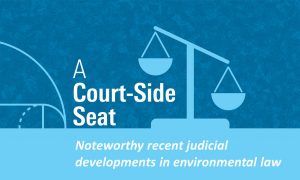In this summary of recent developments in environmental and regulatory law, venues are challenged, standing is upheld, statutory exemption is disputed and more.
THE U.S. SUPREME COURT
Change Must Come from Within … Maryland?
As the new term begins, the Court has agreed to review BP PLC v. Mayor and City Council of Maryland, a decision of the U.S. Court of Appeals for the Fourth Circuit which held that a climate change damages case filed against many energy companies must be heard in the state courts of Maryland and not the federal courts. The petitioners argue that the federal office removal statute authorizes such removal, and the Fourth Circuit’s contrary decision conflicts with rulings from other circuit courts.
THE FEDERAL COURTS
Where Is the Fund in That?
On September 25,2020, in U.S. House of Representatives v. Mnuchin, et al., the U.S. Court of Appeals for the District of Columbia held that the lower court should not have dismissed a lawsuit filed by the U.S. House of Representatives challenging the Executive Branch’s transferal of appropriated funds to the Department of Defense to build a physical barrier along the southern border of the United State. The case is More than $8 billion is at stake, a sum that had been transferred from various federal accounts not involved with building the wall. The appeals court held that the lower court should not have dismissed this lawsuit because the House of Representatives had standing to bring this lawsuit even if the U.S. Senate was not involved with this litigation. Accordingly, the case was returned to the lower court for additional findings, with the appeals court noting that the Constitution’s Appropriation’s Clause serves as an important check on the Executive Branch.
Not So FACA …
On October 1, 2020, the U.S. District Court for the District of Columbia decided NAACP Legal Defense Fund v. Barr, a case involving the Federal Advisory Committee Act (FACA) which was enacted in 1972 to govern the creation and function of the many advisory committees the Executive Branch had been utilizing to assist with the performance of their statutory duties. FACA has been at the forefront of a variety of regulatory disputes, including environmental controversies. (See an August 2019 decision of the Montana federal district court: Western Organizations of Resource Councils v. Bernhard, Secretary of the Interior.) This case concerns the makeup of the President’s Commission on Law Enforcement and he Administration of Justice. The plaintiff complained that the membership of the Commission, comprising only federal and state law enforcement officials, was unbalanced and was thus violative of FACA and its implementing regulations. The Attorney General, in establishing this Commission, stated that it was not intended to be subject to the provisions of FACA, citing a statutory exemption. However, after reviewing this disclaimer, the court held that the exemption was not applicable. The court did not enjoin the work of the Commission, but asked the parties to file briefs describing the appropriate corrective relief the court should order.
THE TEXAS STATE COURTS
Not Quite Water Under the Bridge
On September 22, 2020, the Fourteenth Court of Appeals sitting in Houston decided the case of Sanchez v. Striever, which involves the application of the Texas Citizen Participation Act (TCPA), a law designed to moderate the impacts of litigation on public free speech. A lawsuit filed in bad faith to squelch free speech may result in the award of attorney’s fees against the plaintiff. Here, the plaintiff, Orlando Sanchez, a Houston political figure, was speaking on local school board issues when the defendant surreptitiously poured water on him during a press conference. The defendant tried to flee, but he was identified, allowing Sanchez to sue the defendant for assault by offensive physical conduct. The trial court dismissed the lawsuit, holding that it was subject to the TCPA, and awarded the defendant thousands of dollars in attorney’s fees. On appeal, the Fourteenth Court of Appeals reversed, holding that the defendant’s conduct was a physical assault subject to the Texas Penal Code: “assaultive conduct was not a protected act of protest under the law. The court also reversed the award of attorney’s fees.
The Winds Continue to Die Down
On October 1, 2020, in State of Texas v. Arkema, et al., a Texas state judge dismissed the remaining criminal charges lodged against Arkema Inc., a chemical company operating a facility in Harris County, and some of its executives after a release of toxic chemicals during Hurricane Harvey. After reviewing the case made by the Harris County District Attorney’s office, the judge determined that there was no direct evidence of Arkema’s guilt, and granted the defense’s motion for a directed verdict. However, many civil lawsuits remain to be tried and/or settled.
CALIFORNIA
A Carbon Neutral Stance
Gov. Gavin Newsom of California recently issued Executive Order N-79-20 to accelerate the state’s transition to a carbon neutral future. The state will be using all of its regulatory powers to further reduce the extraction of oil in California (which has significantly declined over the years), ending hydraulic fracturing permitting by 2024, and developing a “Just Transition Roadmap” for affected workers by 2021. In addition, it will be the goal of the State of California that, by 2035, all in-state sales of new cars and trucks will be limited to zero-emission electric vehicles. On September 28, 2020, the Administrator of EPA cautioned Gov. Newsom that these plans raise serious questions regarding its legality and practicality. Specifically, “any attempt by the California Air Resources Board to implement sections of the Order,” may require California to request a waiver of U. S. EPA.
 Gravel2Gavel Construction & Real Estate Law Blog
Gravel2Gavel Construction & Real Estate Law Blog



